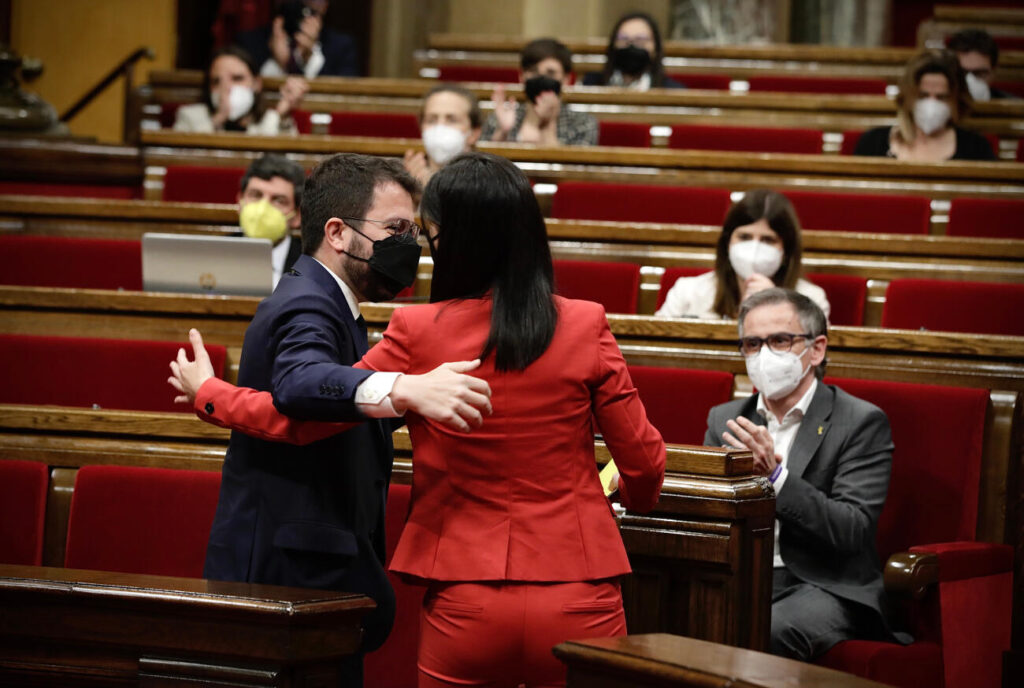21.05.2021 - 11:40
|
Actualització: 21.05.2021 - 13:40
The second day of debates on the presidential bid of Pere Aragonès got underway in the Catalan parliament on Friday morning. The ERC candidate is widely expected to be named the new president of Catalonia after lawmakers vote on his bid later on today after Aragonès’ party struck an eleventh-hour deal with the other main pro-independence force Junts per Catalunya to form a new coalition government earlier this week.
The current interim president got the debates underway on Thursday with a speech to lawmakers in which he promised to defeat the Covid crisis with one hand, and advance the independence of Catalonia with the other.
Opposition parties were then given the chance to respond to Aragonès’ pitch, and the Socialist leader Salvador Illa accused Aragonès of making unattainable promises that are only “frustrating people,” and called on the ERC leader to “nuance” his commitment to carrying out independence. In the last election, the Socialists gained more votes than any other party, but finished up with the same amount of parliament seats as ERC, and without any chances of leading the government after the pro-independence forces extended their majority.
“We all know Catalonia will never be independent,” Illa said, while urging Aragonès to “forget confrontation.” On the other hand, the Socialist leader asked Aragonés to start his presidency by “lifting the veto” on the Catalan Socialist Party. “It makes no sense for him to want to champion dialogue with a veto,” he said, while also extending his group’s hand toward finding agreement.
Vox says coalition will be “short-lived”
The parliamentary session resumed on Friday morning with the speech of Ignacio Garriga, the leader of the far-right Vox party, which gained seats in the 14 February election for the first time and became the fourth largest party in the chamber. Garriga believes that the political infighting that has long haunted Esquerra Republicana and Junts per Catalunya will continue in spite of the face that the two pro-independence parties promise to form a “strong and stable” coalition government.
“This political term will be short-lived because you don’t trust each other. And if you don’t trust each other, how can we trust you?” he said. The far-right leader lashed out at pro-independence groups as “separatist mafia” using taxpayers money to “fund propaganda,” and dismissed their jailed and exiled leaders as “criminals.”
Garriga promised that the party would continue “fighting in the streets and in courts” against “those who want to subvert the constitutional order,” and labelled the talks between Spanish and Catalan governments to solve the independence conflict as “treason against all Spaniards.”
Kingmaker CUP’s votes “not a blank check”
With 9 seats, the far-left CUP party remains the pro-independence kingmaker in parliament, and while it refrained from joining the coalition government, it became the first party to reach a deal with Aragonès to appoint him president in exchange for a joint political agenda.
“Our votes are not a blank check,” said Dolors Sabater, CUP’s frontrunner in the past election, demanding that Aragonès’ administration comply with the deal which includes banning the deployment of police officers to carry out evictions, or else the government would risk losing the parliamentary majority.
The party painted a bleak picture of the challenges facing Catalonia, encompassing “a climate, democratic, economic and social emergency,” and described “capitalism, patriarchy, and fascism” as “dangerous and powerful enemies threatening us.”
Referring to the ongoing territorial dispute with Spain, CUP said they would respect Aragonès’ attempts to solve the crisis through dialogue, but defended the opposite approach too. “We must confront the Spanish state because inside of it there’s no room for our social and civil rights,” she said.
CatECP criticize deal with JxCat
When the leader of left-wing En Comú Podem, Jèssica Albiach, took to the stand, she first apologized to the public for failing to reach a government deal earlier. “For four months, people have seen how we live in a parallel universe,” she said, explaining that “the gap between the street and politics is growing wider.”
Albiach also criticized Aragonès for prioritizing a deal with JxCat despite engaging in talks with her party. “The election results gave us different options. We could have had a progressive government. But we can’t start a new phase if we don’t change the government,” she said, regretting that ERC had opted for a renewed “zombie coalition” forged out of “conformity” and that “nobody really wanted.”
The left-wing leader regretted having “the worst government in the worst of times,” with the handling of the coronavirus pandemic and the economic recovery being “left out” of coalition talks.
Cs lambast pro-independence “populism”
Formerly the largest party in parliament, unionist Ciudadanos went from 36 to 6 seats in the last election, but continue to present themselves as the main anti-independence champions in Catalonia.
The party leader, Carlos Carrizosa, said that pro-independence parties represent “the worst part of populism,” comparing them to the former US president Donald Trump and accusing them of using schools and public media “as tools for social control and separatist indoctrination” and “persecuting the Spanish language.”
Carrizosa denied the existence of a political conflict between Catalonia and Spain, and accused the Socialist party, which overtook Ciudadanos as the main unionist party in the chamber, of fueling the independence conflict by recognizing Catalonia as a nation.
Aragonès will be “controlled remotely” say PPC
Alejandro Fernández, the head of the Catalan branch of Spain’s right-wing People’s Party, said Pere Aragonès will be a figurehead “with no real power” and “controlled remotely” by exiled former president Carles Puigdemont.
Talking about the territorial dispute with Spain, Fernández said it was “an unsolvable conflict” created by pro-independence parties with no real plans to address it, “because they live off the conflict.”
The PP leader also said ERC and JxCat were “addicted to the infighting,” and asked, “how could a government work when its members can’t stand each other?”


